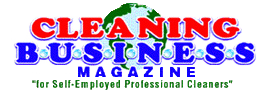Training 2013 and Beyond
In our life time it seems as if the demands on management, production workers and vendors to get more done in less time and with money has never been greater. These are the realities of a changing world and a maturing industry, economy and nation. This trend has been evolving over the last 30 years and I don’t expect it will stop or reverse itself in the future. In fact, I would expect the process to continue to accelerate as we find ways to deal with increasing demands and expectations.
Our greatest challenge won’t be in getting the work done, but in preparing ourselves to cope with the speed of change. The only real opportunity for success in this effort is to hire, train and retain the best workers available.
Who Needs Training?
Everyone. Workers, vendors, management, and customer; there are no exceptions or exclusions. If they are involved in any way with the services you provide or are responsible for, in a building or facility, they need ongoing training. When it comes to cleaning workers, we are sometimes hesitant to provide training because an employee may leave us once we have made an investment in them. In reality the cost is much higher when we retain an untrained worker. Although there are costs to providing training, it is minimal when compared to the costs of inefficient labor and the wasted management time we willingly and endlessly spend on untrained workers.
Effective Training
It’s not what you think. Research is showing that we have it all wrong. We often think of effective training as taking place in a classroom, with students in chairs listening and an expert up front talking or showing a power point or video. What we are finding is that self-paced, group lead hands-on learning experiences are far more effective than any classroom program.
Think about it. What do you want people to learn? How to sit in a chair and listen and be able to answer questions or more importantly, to be able to properly perform tasks in the real world work environment? If you want people to be able to property perform tasks, the emphasis and practice must be on actually performing the task and not on listening to information about how to perform tasks. Definitely some information must be transferred to the worker, but more often than not, we have it totally backwards. In most training programs we focus on information transfer, instead of hands on practice performing the tasks we want properly performed. If you want effective learning of manual skills to take place, quit talking and have participants do what you want them to learn. Within minutes get people up out of their chairs, better yet, get rid of the chairs, and start with small groups performing the tasks the way you want them done. Train your best workers to be your best trainers. Same for testing, keep it short and focus on a minimal amount of need to know information, with the primary emphasis on validating proper performance and not on reciting information. Secondarily, see if participants can correctly answer basic need to know question about the critical aspects of the tasks being performed. What you will find is that everyone will enjoy the training more and will learn what they need to know to do the job right. Lastly, support the learning experience with one on one questions, discussion and performance observations in two days, two weeks and two months after the initial training and retention of skills development and information will be maximized.
Certification
Third party certification of skills is becoming expected and common place in more advanced industries and will over time be a requirement for cleaning professionals. True high level certification should be based on a balanced approach between being able to recite basic critical information and the actual ability to properly perform required tasks.
The Future
You can expect to see continued growth in science based education technology that enables students to learn at their own pace without out costly or hazardous travel. In the next couple of years, what we know today as the cell phone will replace the computer and become our link to an unlimited world of information. The size and intrusiveness of this enabling device will continues to shrink to the point that it will be first worn on and later in the body. In this century or the next, knowledge and skills will be transferred and instead of learned. Some may see this as science fiction, but I can assure you that processes are well under way today to make this and other unimaginable advances, tomorrow’s reality.
















